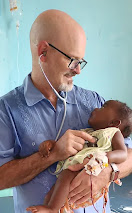The Children of Sankuru
The email came from an old friend on the other side of the world.
“Many children in the Sankuru province of Congo die because their parents cannot pay for their hospitalization — only about $150,” it said.
Wait. Your child dies because you don’t have $150?
That would have been hard to believe, except the email was from Paul Law, MD, MPH, whose story is almost as incredible. In 2006, Paul founded IAN, the Interactive Autism Network, which has successfully supported pathbreaking research on autism spectrum disorders. Back then, he was working at the prestigious Kennedy Krieger Institute at Johns Hopkins in Baltimore.
Today, he’s one of a handful of white people living in Sankuru, the poorest part of a poor nation. It’s an area as big as Ohio, with 3 million people. Sankuru can’t even afford paved roads. Paul, the only pediatrician in the province, gets around on a motorcycle.
How does a guy with an MD and two masters degrees from Hopkins wind up there? Well, he grew up there, the son and grandson of medical missionaries. His grandfather built a hospital there – and was assassinated by rebels in 1964. His father worked there for four decades.
Last December, “after a long and winding career,” he decided to move back there permanently. “I’ve always felt a call to serve the children of Sankuru,” he says simply.
You can follow Paul’s work on his website, Sankuru.org.
Right now, though, Paul is begging for the kids.
“We are starting a new project called FIRST HOPE aimed at saving children's lives by covering these basic hospital expenses. We chose the FIRST HOPE name because parents' first concern and hope is that their child lives,” he writes.
“Please consider a donation of $150 — it could save a child’s life. This fee covers all medications, hospital fees, blood transfusions and whatever else is needed. If you can't give $150, perhaps you could get 10 people to give $15. I’ll send you a picture of the child and his or her story. Any amount will be helpful,” he adds.
He’s even offering a “buy-one-get-one” opportunity.
“A friend is offering a matching fund. If you make a $150 tax-deductible donation in the next 7 days, he will match each donation up to the cost of 10 hospitalizations ($1,500). That means 20 children can receive this life-saving care,” Paul writes.
Sounds like a good deal to me.
To donate, go to: https://www.paypal.com/donate/?hosted_button_id=PAJHZRUSRS5RN








